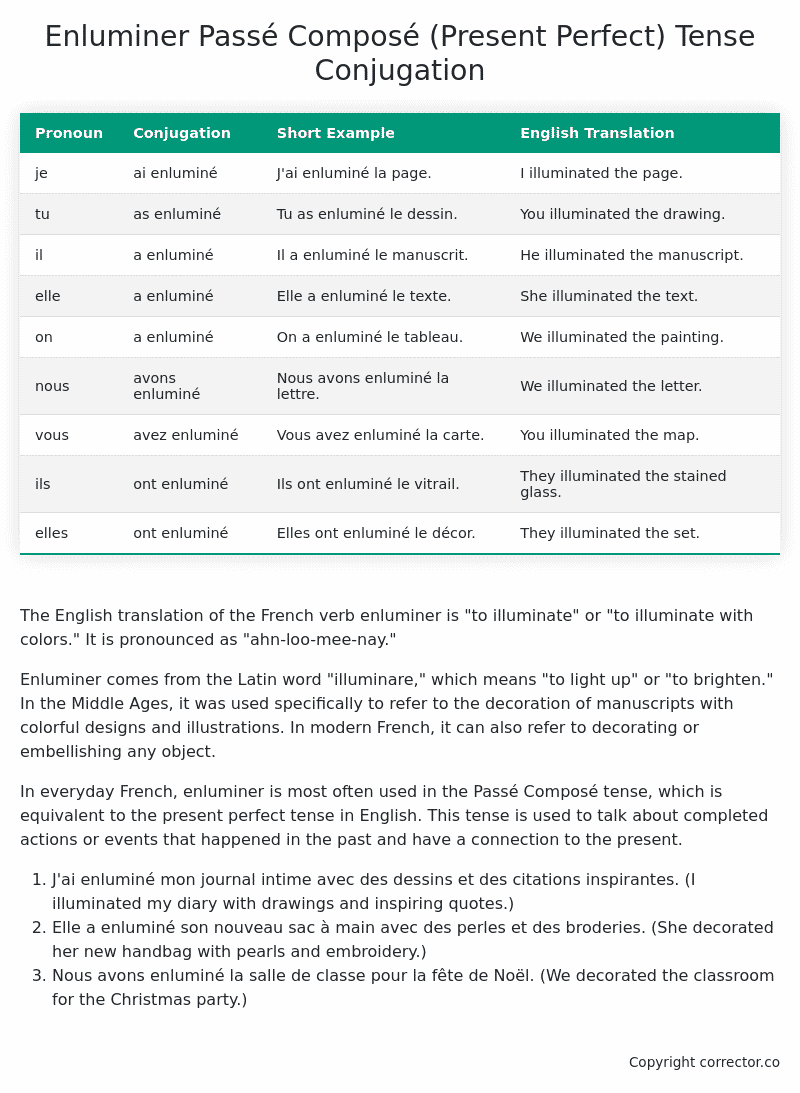Passé Composé (Present Perfect) Tense Conjugation of the French Verb enluminer
Introduction to the verb enluminer
The English translation of the French verb enluminer is “to illuminate” or “to illuminate with colors.” It is pronounced as “ahn-loo-mee-nay.”
Enluminer comes from the Latin word “illuminare,” which means “to light up” or “to brighten.” In the Middle Ages, it was used specifically to refer to the decoration of manuscripts with colorful designs and illustrations. In modern French, it can also refer to decorating or embellishing any object.
In everyday French, enluminer is most often used in the Passé Composé tense, which is equivalent to the present perfect tense in English. This tense is used to talk about completed actions or events that happened in the past and have a connection to the present.
- J’ai enluminé mon journal intime avec des dessins et des citations inspirantes. (I illuminated my diary with drawings and inspiring quotes.)
- Elle a enluminé son nouveau sac à main avec des perles et des broderies. (She decorated her new handbag with pearls and embroidery.)
- Nous avons enluminé la salle de classe pour la fête de Noël. (We decorated the classroom for the Christmas party.)
Table of the Passé Composé (Present Perfect) Tense Conjugation of enluminer
| Pronoun | Conjugation | Short Example | English Translation |
|---|---|---|---|
| je | ai enluminé | J’ai enluminé la page. | I illuminated the page. |
| tu | as enluminé | Tu as enluminé le dessin. | You illuminated the drawing. |
| il | a enluminé | Il a enluminé le manuscrit. | He illuminated the manuscript. |
| elle | a enluminé | Elle a enluminé le texte. | She illuminated the text. |
| on | a enluminé | On a enluminé le tableau. | We illuminated the painting. |
| nous | avons enluminé | Nous avons enluminé la lettre. | We illuminated the letter. |
| vous | avez enluminé | Vous avez enluminé la carte. | You illuminated the map. |
| ils | ont enluminé | Ils ont enluminé le vitrail. | They illuminated the stained glass. |
| elles | ont enluminé | Elles ont enluminé le décor. | They illuminated the set. |
Other Conjugations for Enluminer.
Le Present (Present Tense) Conjugation of the French Verb enluminer
Imparfait (Imperfect) Tense Conjugation of the French Verb enluminer
Passé Simple (Simple Past) Tense Conjugation of the French Verb enluminer
Passé Composé (Present Perfect) Tense Conjugation of the French Verb enluminer (this article)
Futur Simple (Simple Future) Tense Conjugation of the French Verb enluminer
Futur Proche (Near Future) Tense Conjugation of the French Verb enluminer
Plus-que-parfait (Pluperfect) Tense Conjugation of the French Verb enluminer
Passé Antérieur (Past Anterior) Tense Conjugation of the French Verb enluminer
Futur Antérieur (Future Anterior) Tense Conjugation of the French Verb enluminer
Subjonctif Présent (Subjunctive Present) Tense Conjugation of the French Verb enluminer
Subjonctif Passé (Subjunctive Past) Tense Conjugation of the French Verb enluminer
Subjonctif Imparfait (Subjunctive Imperfect) Tense Conjugation of the French Verb enluminer
Subjonctif Plus-que-parfait (Subjunctive Pluperfect) Tense Conjugation of the French Verb enluminer
Conditionnel Présent (Conditional Present) Tense Conjugation of the French Verb enluminer
Conditionnel Passé (Conditional Past) Tense Conjugation of the French Verb enluminer
L’impératif Présent (Imperative Present) Tense Conjugation of the French Verb enluminer
L’infinitif Présent (Infinitive Present) Tense Conjugation of the French Verb enluminer
Struggling with French verbs or the language in general? Why not use our free French Grammar Checker – no registration required!
Get a FREE Download Study Sheet of this Conjugation 🔥
Simply right click the image below, click “save image” and get your free reference for the enluminer present perfect tense conjugation!

Enluminer – About the French Passé Composé (Present Perfect) Tense
Formation of the Passé Composé
Set the auxiliary verb with either
Conjugate the auxiliary verb
Add the past participle
Common everyday usage patterns
Narrating Past Events
Sequential Actions
Describing Completed Actions
Interactions with other tenses
Imperfect Tense
Conditional and Future Tenses
Summary
I hope you enjoyed this article on the verb enluminer. Still in a learning mood? Check out another TOTALLY random French verb conjugation!


